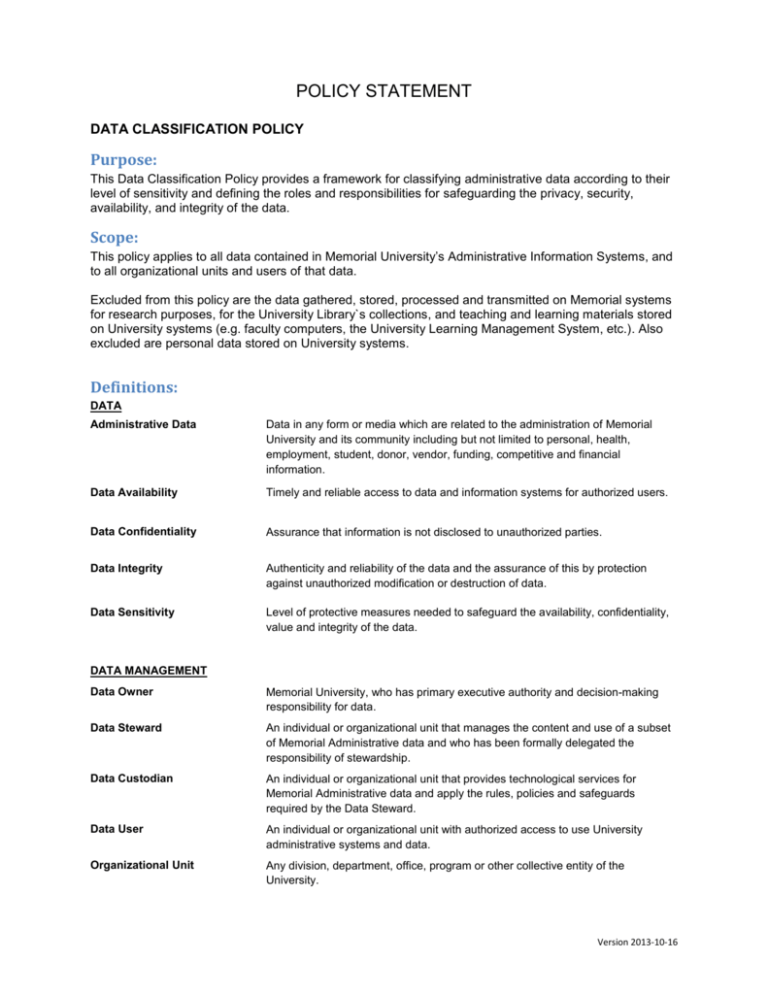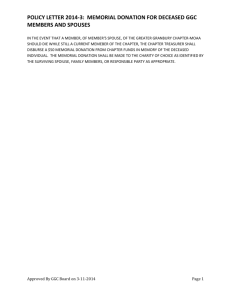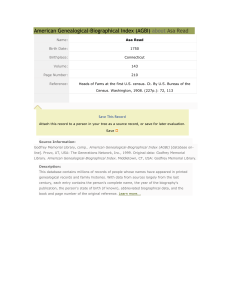Data Classification Scheme - Memorial University of Newfoundland
advertisement

POLICY STATEMENT DATA CLASSIFICATION POLICY Purpose: This Data Classification Policy provides a framework for classifying administrative data according to their level of sensitivity and defining the roles and responsibilities for safeguarding the privacy, security, availability, and integrity of the data. Scope: This policy applies to all data contained in Memorial University’s Administrative Information Systems, and to all organizational units and users of that data. Excluded from this policy are the data gathered, stored, processed and transmitted on Memorial systems for research purposes, for the University Library`s collections, and teaching and learning materials stored on University systems (e.g. faculty computers, the University Learning Management System, etc.). Also excluded are personal data stored on University systems. Definitions: DATA Administrative Data Data in any form or media which are related to the administration of Memorial University and its community including but not limited to personal, health, employment, student, donor, vendor, funding, competitive and financial information. Data Availability Timely and reliable access to data and information systems for authorized users. Data Confidentiality Assurance that information is not disclosed to unauthorized parties. Data Integrity Authenticity and reliability of the data and the assurance of this by protection against unauthorized modification or destruction of data. Data Sensitivity Level of protective measures needed to safeguard the availability, confidentiality, value and integrity of the data. DATA MANAGEMENT Data Owner Memorial University, who has primary executive authority and decision-making responsibility for data. Data Steward An individual or organizational unit that manages the content and use of a subset of Memorial Administrative data and who has been formally delegated the responsibility of stewardship. Data Custodian An individual or organizational unit that provides technological services for Memorial Administrative data and apply the rules, policies and safeguards required by the Data Steward. Data User An individual or organizational unit with authorized access to use University administrative systems and data. Organizational Unit Any division, department, office, program or other collective entity of the University. Version 2013-10-16 POLICY STATEMENT RELATED POLICIES/STANDARDS ATIPPA Access to Information and Protection of Privacy Act (ATIPPA), the provincial statute of Newfoundland and Labrador which requires all provincial public sector organizations to prevent the unauthorized collection, use or disclosure of personal information by these organizations. PCI DSS Payment Card Industry Data Security Standards (PCI DSS), the standards used by the credit card industry to protect cardholder data. PHIA Personal Health Information Act (PHIA) is the provincial privacy law specific to the health sector which establishes the rules for collection, use, and disclosure of confidential individual health information. PIPEDA Personal Information Protection and Electronic Documents Act (PIPEDA) is the federal law that governs how private and public sector organizations may collect, use or disclose personal information for business outside the province. Policy: All Memorial University administrative data must be protected and managed according to the minimum standards set out by the policy and in accordance with related security, privacy, data access, records retention policy and standards. To determine how to manage administrative information assets, data must be assigned to one of the four data classes defined in the Data Classification Scheme (see table below). Data Stewards must identify and classify the data that are used by their business operations and processes. Aggregates of data of mixed classification (e.g., reports, data files) must be classed at the highest level of protection applicable to the information contained within. Data which have not been classified should be considered Sensitive until a different class is determined. This policy is informed by the following legal statutes and standards: Access to Information and Protection of Privacy Act (ATIPPA) of Newfoundland and Labrador Personal Health Information Act (PHIA) Personal Information Protection and Electronic Documents Act (PIPEDA) Payment Card Industry Data Security Standard (PCI DSS) Version 2013-10-16 POLICY STATEMENT Data Classification Scheme Data Class Examples Highly Sensitive Memorial University administrative data which are governed specifically by law, contract or University policy to be treated as highly confidential, protected at the highest level of security and accessed by a very small subset of explicitly authorized users. Loss or unauthorized disclosure will have a serious adverse impact on the operation, reputation, safety, or financial stability of the University or individuals. Sensitive University administrative data which must be treated as confidential and protected for legal, ethical, proprietary or privacy reasons to ensure a controlled release to authorized users with a legitimate business need. Loss or unauthorized disclosure may have a moderate or short-term adverse impact on the operation, reputation, safety or financial stability of the University or individuals. Internal Use Data to be treated as moderately sensitive and protected for business reasons against loss and unauthorized disclosure even where no policy or legal requirement exists. These data are generally not available to external parties. Loss or unauthorized disclosure would be an inconvenience, having little or no permanent adverse effect on the operation, reputation, safety, or financial stability of the University or individuals. Public Use Publically posted information with no legal restrictions on access, and no protection required for access, availability, integrity or confidentiality. Available to the general public. Disclosure will have a little to no adverse effect on the operations, reputation, safety, or financial stability of the University or individuals. Data sealed by court order Data governed by contracts or non-disclosure agreements Personal information governed by ATIPPA, PHIA, PIPEDA, PCI DSS o Name/Birthdate/Social Insurance Number o Name/Social Insurance Number o Name/Credit Card Number o Name/Bank Account Number o Name/Driver's License Number o Name/Medical Insurance Number System Passwords and private encryption keys that permit access to Highly-Sensitive Data Personnel and payroll information Personal medical information Personal financial data and tax information Prospect, admissions and student data Donor and funding agency data Security logs and file encryption keys Financial and billing statements Library transactions Health and safety data Facilities management information System Passwords and private encryption keys that permit access to sensitive data Internal directory listings Non-confidential meeting minutes Competitive information, e.g., admission averages, graduation rates, scholarship winner rates Internal websites Internal file directories Memorial University partner or sponsor information where no more restrictive confidentiality agreement exists Marketing material Press releases, newsletters, newspapers, and magazines Annual reports Course catalog and class schedule MUN website, maps and public directories Department web pages Version 2013-10-16 POLICY STATEMENT Data Management Roles and Responsibilities Data Owner – The University Role: Govern Memorial University administrative data. Responsibilities: Hold ultimate executive responsibility for the data. Determine appropriate use of the data. Establish policy and procedures to ensure good data management across the University. Appoint and oversee data stewards and custodians. Authorize access to highly-sensitive data. Data Steward – Organizational Units Role: Manage Memorial administrative data. Responsibilities: Ensure good data management across the University. Interpret and confirm compliance with legal and University policy requirements. Classify a subset of data, determine risk tolerance to threats, specify controls required to secure data, and communicate needs to owners, custodians and users. Develop and implement data quality and data definition standards. Verify that controls exist to ensure the accuracy, authenticity and integrity of the data, and confirm compliance with controls. Educate users on appropriate use and protection of data. Delegate responsibility for responsibility to trained University administrators. Authorize access to sensitive and internal data. Data Custodian – Role: Safeguard Memorial administrative data. Responsibilities: Implement and maintain the technologies, infrastructure and controls that support the care of and access to administrative data. Data User - Role: Access Memorial administrative data. Responsibilities: Comply with rules, procedures and controls. Make every reasonable effort to protect data from threats to tampering, loss and unauthorized disclosure. Define data requirements for business needs. Related Policies Appropriate Use of Computing Resources Data Removal Electronic Data Security (EDS) Information Request Privacy Records Management Procedures To be determined with each C&C Unit e.g. Requesting Data Access Protecting Sensitive Data Version History SLT Approval Date: 16 Oct 2013 Effective Date: 16 Oct 2013 Review Date: 31 Mar 2014 Authority: Director of Computing & Communications Sponsor: Senior Leadership Team Contact: Director of Computing & Communications, (709) 864-4554 Version 2013-10-16


